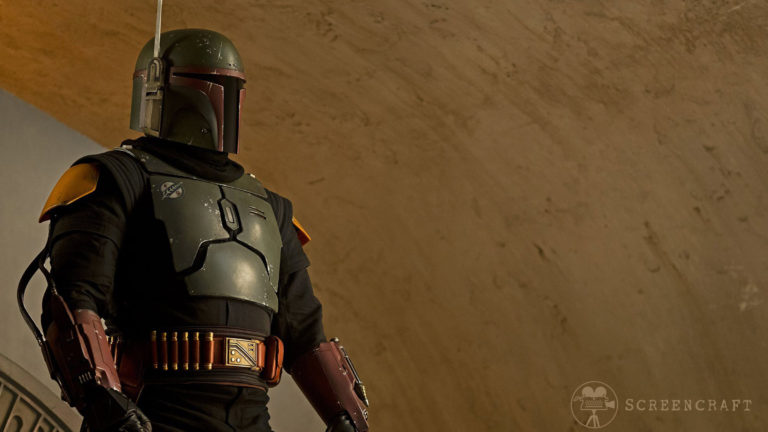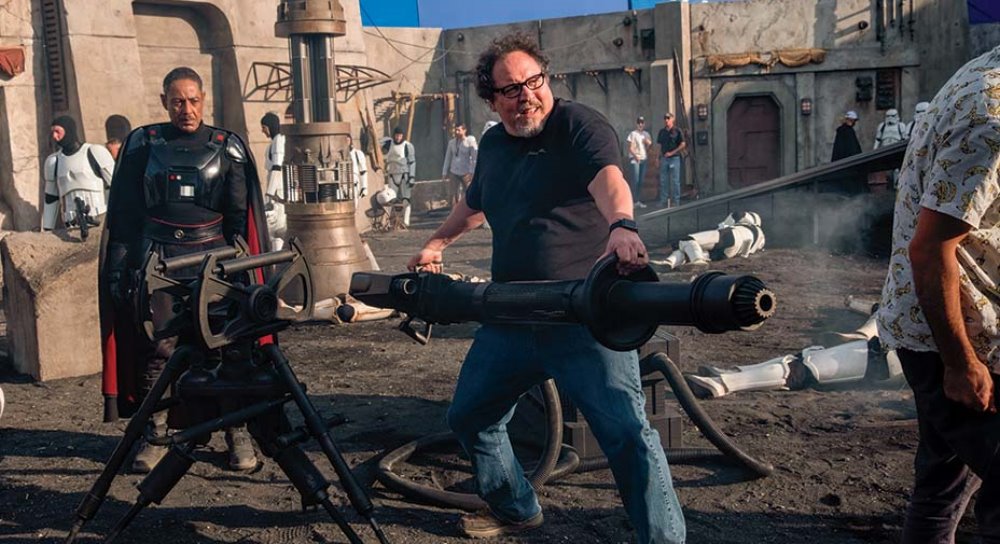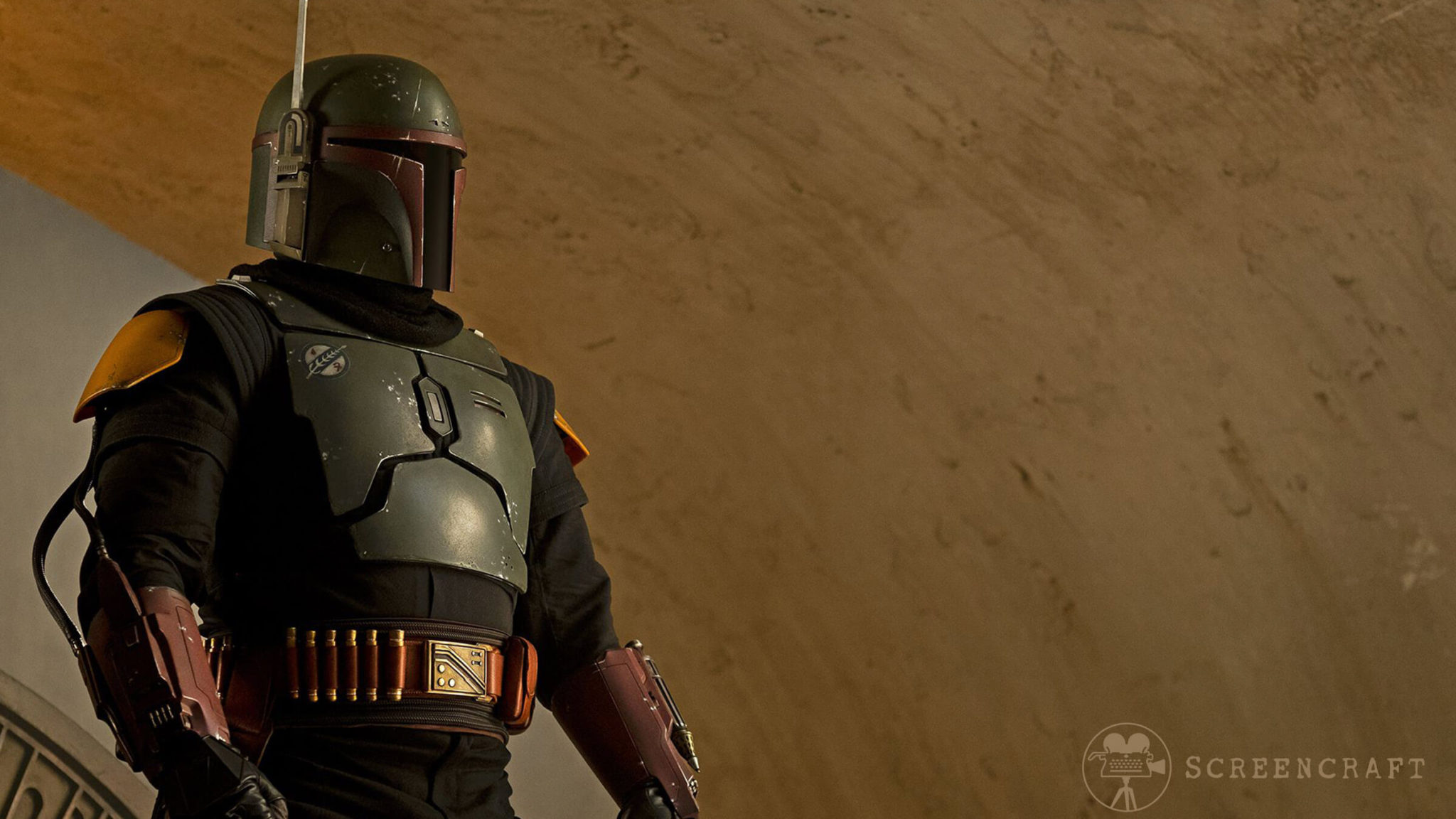7 Screenwriting Lessons from 'The Mandalorian' Creator Jon Favreau

What lessons can Jon Favreau, the writer and creator of The Mandalorian, teach screenwriters about the art, craft, and business of screenwriting?
Jon Favreau's career in filmmaking spans 30 years, encompassing experience working as an actor, writer, director, and producer in pretty much any genre you can think of, from Christmas comedies (Elf) to multimillion dollar superhero tentpoles (Iron Man) to low budget indie flicks (Chef) to hugely popular Star Wars TV shows (The Mandalorian, The Book of Boba Fett).
Favreau has done it all, and because he has done it all, he's a wellspring of knowledge for aspiring screenwriters, directors, and producers alike. So, here are seven things you can learn from one of the most multifaceted filmmakers working today.
Use Influences and Innovate What Has Come Before
"You're influenced by what others have done before you and what you can innovate for those stories because you're competing always as a writer."
Screenwriters can get frustrated by always hearing about the need to write unique and original stories, only to then hear or learn that everything has been done. It's frustrating. Especially when trying to figure out what types of stories you should be developing and writing that can offer the best chance to break through.
Hollywood loves the familiar. Audiences do too. But it's the innovation of the familiar that truly creates something original and unique in their eyes. You take what has proven to be a success, and you put your own unique and original spin on it to stand out. That's the key to success in Hollywood as a screenwriter because you present the best of both worlds.
- A genre, character type, or story type that is familiar and proven in the eyes of both Hollywood and the audience.
- A unique and original take on that genre, character type, or story type that makes it feel fresh and new.
Seek out original stories and characters that haven't been done before, yes. But realize the power of using previous influences for innovation opportunities.

'The Book of Boba Fett'
Don't Try to Sell on Pitch — Write the Thing
"I always found it easier to write than to develop as a way to present what my vision was for something. If you're developing material, you're having to advocate for ideas in the abstract, which is such a difficult thing to do."
One of the most common questions screenwriters ask is, "Can you sell a concept without a script?"
My instant reaction (beyond a quick "no") is, "Why would you want to do that?" Writing the script allows you to be able to have full initial control of your creation. You don't need to advocate for ideas and concepts. If you write the script, you present them within the confines of your vision.
These days, unknown screenwriters can't sell concepts. There needs to be a script. Everyone has ideas. An idea is nothing until it is presented in whole. That's how you sell Hollywood on your concepts. Don't waste your time trying to sell a concept. And don't waste your time trying to pitch it to others. Write the thing. That script will be the best way for people to see your intentions, inspirations, and inventiveness.
When You're Inspired, Don't Wait for Permission to Write
"[Writing is] the most rewarding, but also the most challenging because if it doesn't come to you, there are no shortcuts. You have to either write or not write. And so if I have the inspiration to write, I often don't wait for permission. I just start to go."
Use that inspiration to drive you to get that script done. Don't sit on it. Don't wait for the universe to give you permission to write it. Inspiration is magic. It's the universe telling you to do something that you are destined to do. If you push back on that, waiting for the perfect time and place to start writing, the inspiration will fade — and you need that inspiration to drive your passion. Don't wait for permission or perfect circumstances to arise. Just go write it.
Note: This doesn't mean that you go write that vomit draft without any front-end work. It means that you should dive into the development process of visualization, research, and whatever else you need to do to not just write the script but write it well.
Inactivity Is Worse than Failure or Missteps
"I would rather write and waste my time because it always leads to something else good. I know from having worked in a creative field long enough that inactivity is more detrimental than wasting your time on something that doesn't go anywhere because it will lead to something else. The creative process is one of emergence. There are things that I did earlier in my career that I see culminating now."
A concept, script, sequence, scene, or character that ends up not working on the page always seems to reappear in future projects. And that is why you always need to be developing and writing to keep your creative mind active and creating. Inactivity is far worse than writing things that don't come together collectively.
Keep a notebook or use your smartphone to log concepts and ideas that you have. If you're in between scripts and haven't decided on the next, keep notes on the things going through your mind as you try and figure out what to write next. The concepts, stories, and characters that don't lead anywhere now could become the answers to your problems a few years down the road.

'Chef'
Writing for the Screen Is Different Than Writing a Novel
"Writing is a learning process. Unfortunately, generally, you have to wait for something to actually get produced that you've written… Until you've actually seen your material go through the gauntlet of the editing process and the rewriting that comes in post-production, and wind up on the big screen, you don't really have a full grasp of what writing for the screen is."
While this is unfair wisdom to unproduced screenwriters, there's still a nugget of information that can benefit the novice screenwriter. Writing for the screen is much different than writing a novel. When you write a novel, the publisher isn't editing it to realize their own vision for your story. They are there to realize your vision.
Cinema, on the other hand, is a collaborative medium. And, in the end, it's a director's medium. It only starts with the written word. The sooner screenwriters realize that, the better. You can prepare yourself for your career and learn to take the notes given to you by producers, development executives, and directors in a much more positive light. It's a collaboration. Realizing and understanding this will help you take feedback in a collaborative way.
Television is a writer's medium, however. The series creator and showrunner are writers. And they have a support group of writers working for them.
But when you're writing for the big screen, be ready to learn how to handle notes and feedback.
Read ScreenCraft's How Do Screenwriters Know When to Embrace or Reject Notes and Feedback?
Start Writing Before Your Brain Is Bombarded by the World
"The thing I've landed on now is writing before I'm fully awake. In other words, before the emails, before your brain is bombarded with the world, where you have your wits about you because you're awake enough that you're not disoriented, but your brain hasn't hardened for the day yet."
As we know, distractions are aplenty in this world. Favreau's new writing process is writing in the morning before everyday life gets in the way.
When you're writing, you want to limit as many distractions as possible. Silence any rings, disable any notifications or turn the phone off. Another option is to get through your emails, text responses, and calls before you sit down to write. Still, the point Favreau is making is that, in his life, pre-processing that information forces the mind to wander to those responsibilities of the world.
Whatever process you choose, limit as many distractions as possible so that you can escape into your world and allow that world, and the characters that inhabit it, to live and breathe within it. And that happens only when your mind is focused on that world.
Favreau's Answer to Writer's Block? Write
"There's a trick I originally used for writer's block where you get writing even if you have to get through some nonsense, a few pages of nonsense. Just get the pump primed and write. The hard part is like, how do you write you? You write. That's how you do it. It's easier said than done. But the only way to write is to write."
It's a simple solution — write through it. If you decide to stop and wait for inspiration, that's a bad habit to get into. Professional writers don't have time for writer's block. When you're a pro, you're on a deadline. The best thing that you can do is train yourself how to write like a pro. Gives yourself professional deadlines.
- 6-8 weeks for the first draft
- 2 weeks for each draft after
When you hit a difficult spot in your script, write through it. You can always update it in the rewrite phase. Just muscle through it.

Giancarlo Esposito and Jon Favreau on the set of 'The Mandalorian'
Ken Miyamoto has worked in the film industry for nearly two decades, most notably as a studio liaison for Sony Studios and then as a script reader and story analyst for Sony Pictures.
He has many studio meetings under his belt as a produced screenwriter, meeting with the likes of Sony, Dreamworks, Universal, Disney, Warner Brothers, as well as many production and management companies. He has had a previous development deal with Lionsgate, as well as multiple writing assignments, including the produced miniseries Blackout, starring Anne Heche, Sean Patrick Flanery, Billy Zane, James Brolin, Haylie Duff, Brian Bloom, Eric La Salle, and Bruce Boxleitner, and the feature thriller Hunter’s Creed starring Duane “Dog the Bounty Hunter” Chapman, Wesley Truman Daniel, Mickey O’Sullivan, John Victor Allen, and James Errico. Follow Ken on Twitter @KenMovies
For all the latest ScreenCraft news and updates, follow us on Twitter, Facebook, and Instagram.
Tags
Get Our Screenwriting Newsletter!
Get weekly writing inspiration delivered to your inbox - including industry news, popular articles, and more!




























